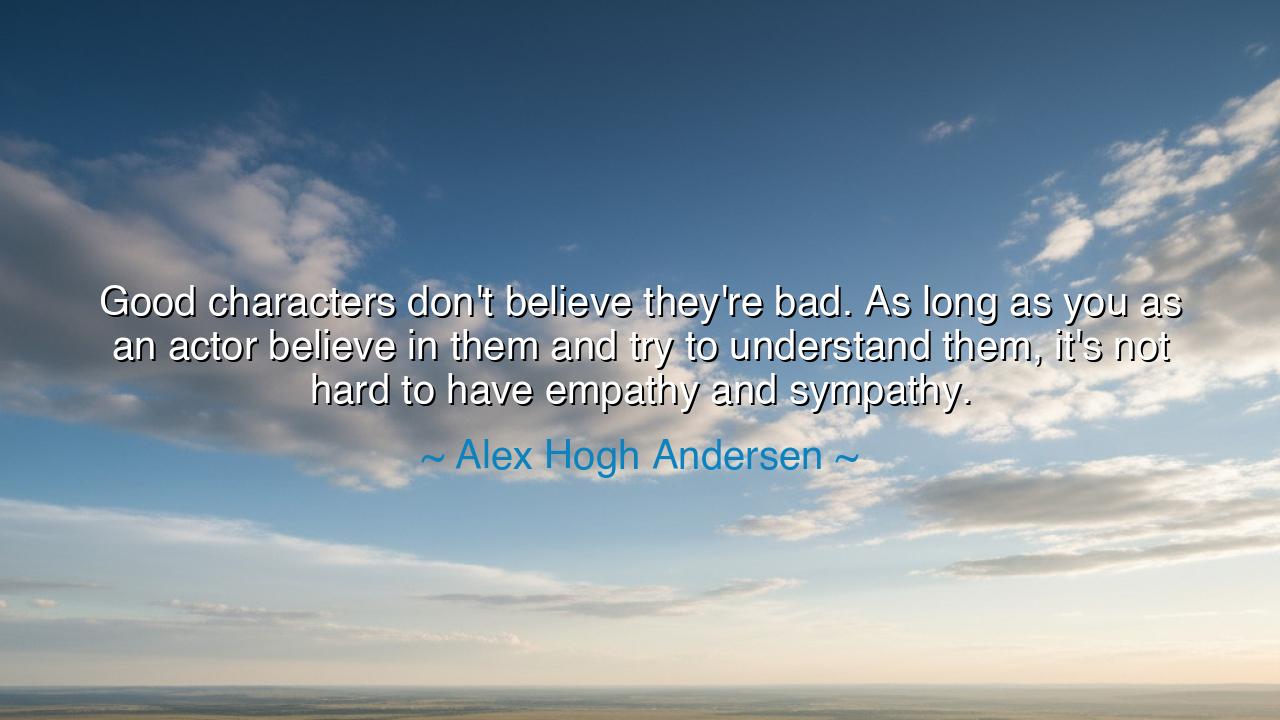
Good characters don't believe they're bad. As long as you as an
Good characters don't believe they're bad. As long as you as an actor believe in them and try to understand them, it's not hard to have empathy and sympathy.






Hear the words of Alex Høgh Andersen, who gave life to Ivar the Boneless, a figure both feared and pitied. He declares: “Good characters don’t believe they’re bad. As long as you as an actor believe in them and try to understand them, it’s not hard to have empathy and sympathy.” This truth, though born in the realm of acting, reaches far beyond the stage and the screen. It speaks to the essence of human nature, to the way each of us justifies our deeds, and to the power of understanding that bridges the gulf between judgment and compassion.
When Andersen says that characters do not see themselves as bad, he touches upon the ancient wisdom that no villain believes himself a villain. To the tyrant, his rule is necessary; to the rebel, his violence is justice; to the betrayer, his act is survival. Even the darkest of souls constructs a story in which he is the hero of his own tale. Thus, the actor’s task is not to mock or condemn, but to enter that story, to walk in those shoes, to believe as the character believes. Only then can performance become truth, and only then can the audience glimpse the humanity even in the most terrible figure.
This insight has its origin in the craft of drama itself. The tragedians of Greece, like Sophocles and Euripides, portrayed kings who brought ruin upon themselves, not because they longed for evil, but because they believed in their own righteousness. Oedipus sought truth, not destruction, and yet found both. Medea acted out of love turned to rage, believing her vengeance just. These tales endure because they show us the mirror of Andersen’s words: that even those we condemn believe in their own cause. To recognize this is to begin the path toward empathy.
History too affirms this lesson. Consider the tale of Napoleon Bonaparte. To his enemies, he was a tyrant, spreading war across Europe. Yet to himself, he was a liberator, bringing law and order where chaos reigned. He crowned himself emperor, not because he thought himself evil, but because he believed destiny had chosen him. In understanding this, we see not only the dangers of unchecked ambition, but also the truth that men who are branded villains may see themselves as saviors. This is the paradox Andersen’s words reveal: that judgment is simple, but understanding requires effort.
The deeper meaning is that to portray or to comprehend another person truly, one must seek their inner reasoning. As Andersen teaches, the actor must believe in the character to embody them fully. So too must we, as fellow human beings, seek to understand others, even when we oppose their actions. This does not mean excusing wrong, but it does mean grasping how one arrives at such choices. In this way, we cultivate both empathy and sympathy, virtues that make us wiser and gentler in a world too eager to condemn.
Beloved listener, take this teaching into your heart. In your own life, when you meet one whose actions anger or confuse you, ask not only, What have they done? but also, What story do they tell themselves? Seek the inner logic, however flawed, and you will find it easier to meet them with compassion. Like the actor who enters the soul of his character, enter the perspective of those around you. In doing so, you will not weaken your judgment, but strengthen your humanity.
Therefore, let this wisdom guide you: see every soul as the hero of its own tale. Understand this, and you will be less quick to condemn, more ready to listen, more able to forgive. For in the end, as Andersen teaches, it is not difficult to find empathy and sympathy, if only we dare to believe in the humanity even of those we oppose. And in such belief lies the path to peace, to wisdom, and to the highest form of art: the art of living well among others.






AAdministratorAdministrator
Welcome, honored guests. Please leave a comment, we will respond soon